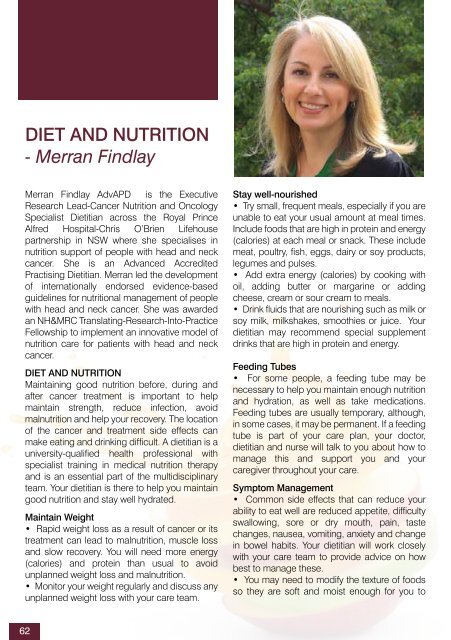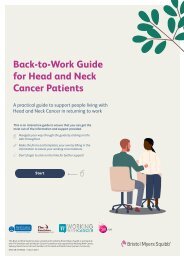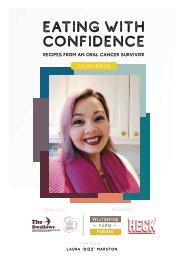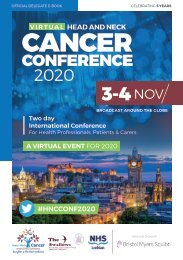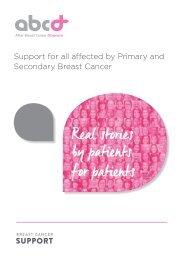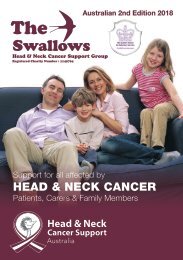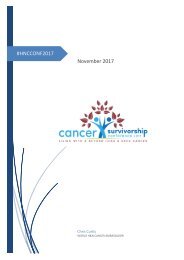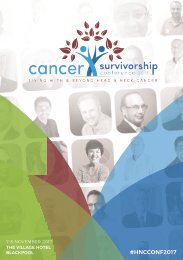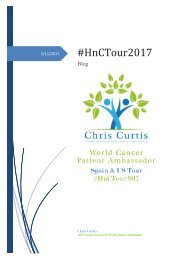The Swallows Australian Edition Magazine
You also want an ePaper? Increase the reach of your titles
YUMPU automatically turns print PDFs into web optimized ePapers that Google loves.
DIET AND NUTRITION<br />
- Merran Findlay<br />
Merran Findlay AdvAPD is the Executive<br />
Research Lead-Cancer Nutrition and Oncology<br />
Specialist Dietitian across the Royal Prince<br />
Alfred Hospital-Chris O’Brien Lifehouse<br />
partnership in NSW where she specialises in<br />
nutrition support of people with head and neck<br />
cancer. She is an Advanced Accredited<br />
Practising Dietitian. Merran led the development<br />
of internationally endorsed evidence-based<br />
guidelines for nutritional management of people<br />
with head and neck cancer. She was awarded<br />
an NH&MRC Translating-Research-Into-Practice<br />
Fellowship to implement an innovative model of<br />
nutrition care for patients with head and neck<br />
cancer.<br />
DIET AND NUTRITION<br />
Maintaining good nutrition before, during and<br />
after cancer treatment is important to help<br />
maintain strength, reduce infection, avoid<br />
malnutrition and help your recovery. <strong>The</strong> location<br />
of the cancer and treatment side effects can<br />
make eating and drinking difficult. A dietitian is a<br />
university-qualified health professional with<br />
specialist training in medical nutrition therapy<br />
and is an essential part of the multidisciplinary<br />
team. Your dietitian is there to help you maintain<br />
good nutrition and stay well hydrated.<br />
Maintain Weight<br />
• Rapid weight loss as a result of cancer or its<br />
treatment can lead to malnutrition, muscle loss<br />
and slow recovery. You will need more energy<br />
(calories) and protein than usual to avoid<br />
unplanned weight loss and malnutrition.<br />
• Monitor your weight regularly and discuss any<br />
unplanned weight loss with your care team.<br />
Stay well-nourished<br />
• Try small, frequent meals, especially if you are<br />
unable to eat your usual amount at meal times.<br />
Include foods that are high in protein and energy<br />
(calories) at each meal or snack. <strong>The</strong>se include<br />
meat, poultry, fish, eggs, dairy or soy products,<br />
legumes and pulses.<br />
• Add extra energy (calories) by cooking with<br />
oil, adding butter or margarine or adding<br />
cheese, cream or sour cream to meals.<br />
• Drink fluids that are nourishing such as milk or<br />
soy milk, milkshakes, smoothies or juice. Your<br />
dietitian may recommend special supplement<br />
drinks that are high in protein and energy.<br />
Feeding Tubes<br />
• For some people, a feeding tube may be<br />
necessary to help you maintain enough nutrition<br />
and hydration, as well as take medications.<br />
Feeding tubes are usually temporary, although,<br />
in some cases, it may be permanent. If a feeding<br />
tube is part of your care plan, your doctor,<br />
dietitian and nurse will talk to you about how to<br />
manage this and support you and your<br />
caregiver throughout your care.<br />
Symptom Management<br />
• Common side effects that can reduce your<br />
ability to eat well are reduced appetite, difficulty<br />
swallowing, sore or dry mouth, pain, taste<br />
changes, nausea, vomiting, anxiety and change<br />
in bowel habits. Your dietitian will work closely<br />
with your care team to provide advice on how<br />
best to manage these.<br />
• You may need to modify the texture of foods<br />
so they are soft and moist enough for you to<br />
62


